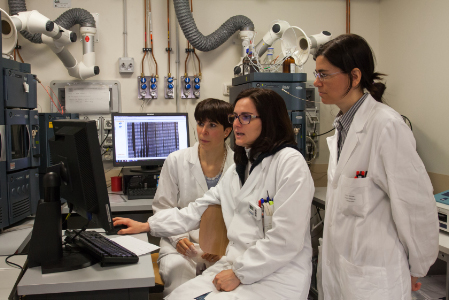Bisphosphonates are important in the management of tumours with secondary bone involvement. Recent findings have suggested that these drugs also have an effect on primary tumour burden. Telomerase is a cellular ribonucleoprotein reverse transcriptase responsible for elongation of the telomere. Telomerase expression is increased in many cancers. We studied the direct effects of clodronate, alendronate, and pamidronate (from 10(-6) to 10(-4) M) on MCF-7 human breast cancer cell line. In particular, we investigated their effect on viability, proliferation, apoptosis, human telomerase reverse transcriptase expression (h-TERT) by RT-PCR and telomerase activity. Alendronate and pamidronate showed an inhibition of viability (-63 and -35%, respectively; p < 0.0001) and proliferation of cancer cells, while no effect was observed with clodronate. Amino-bisphosphonates induced a significant increase of apoptosis in MCF-7. In addition, they showed a significant decrease in telomerase expression and activity with respect to control and to clodronate.In addition, it is well known that gene expression of hTERT, the catalytic subunit of the telomerase, is elevated in prostatic cancer. In the prostate cancer cell lines we investigated the effects on hTERT gene expression of several bisphosphonates. We also evaluated whether the observed levels of expression were affected by the exposure to an analogue of the geranylgeranylpyrophosphate, the geranylgeraniol used to recover the mevalonate pathway. Our results showed that the amino-bisphosphonates down-regulate hTERT gene expression and that combined treatment with geranylgeraniol and zoledronate was able to revert only partially the effects on viability; on the contrary, hTERT gene down-regulation was not affected by the restoration of the mevalonate pathway. These results support the hypothesis that prostatic cancer cells are targeted by amino-bisphosphonates also through a different mechanism from the mevalonate pathway.







